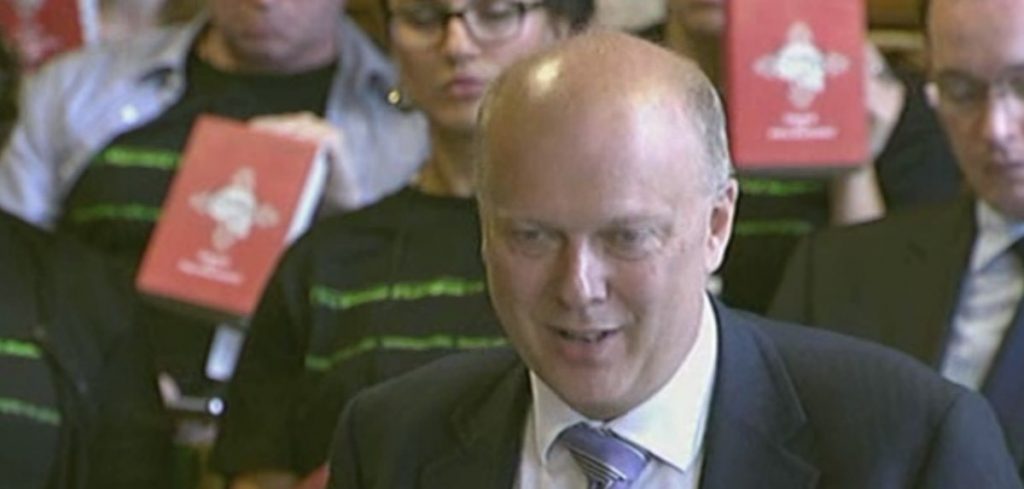Damning annual prison report should make Grayling think again
The chief inspector of prisons' annual report has just been published and it is as damning as you would expect. Nick Hardwick is doing the best he can to get the chaos of Britain's prisons into the public sphere and to tentatively offer explanations for why it is taking place.
The situation is currently verging on catastrophic. He found a "significant decline in safety". There were often weaknesses in basic safety processes such as risk assessments for new prisoners and prisoners in crisis being held in segregated areas in poor conditions. Drugs in prisons – legal and illegal – were becoming a source of debt, with the associated bullying and violence which comes with that.
The official National Offender Management Service (Noms) data found a 14% annual rise in assaults involving adult male prisoners – the highest for any year which we have data for. There was a 38% rise in serious assaults. Suicides were up 69% to 88, the highest figure for a decade.
"Inspections… revealed a further sharp decline in outcomes across all areas."
Where things are going right, it is despite the Ministry of Justice, not because of it.
"In many prisons, strong relationships between staff and prisoners mitigated the worst effects of overcrowding and helped make prisons safer than they would otherwise have been," the report found.
Hardwick tries to tie together some of the strands to offer an explanation for why this is happening. Sure, it's about spending cuts and prison officer numbers. But he goes further and lays some of the blame on Chris Grayling's draconian new prison regime.
He cites a reduction of £84 million in public sector prison running costs, which led to a "significant loss of more experienced staff". This compares rather worryingly with the ever-growing prison population, which, at 85,252 in March, was at 99% of the usable operational capacity.
Hardwick then notes that "a significant policy agenda included plans to transform rehabilitation arrangements, make it harder for prisoners to earn privileges and tighten the rules for temporary release". He goes on to say:
"Increases in self-inflicted deaths, self-harm and violence cannot be attributed to a single cause. They reflect some deep-seated trends and affect prisons in both the public and private sectors. Nevertheless, in my view, it is impossible to avoid the conclusion that the conjunction of resource, population and policy pressures, particularly in the second half of 2013-14 and particularly in adult male prisons, was a very significant factor for the rapid deterioration in safety and other outcomes we found as the year progressed and that were reflected in Noms' own safety data. The rise in the number of self-inflicted deaths was the most unacceptable feature of this. It is important that the bald statistics do not disguise the dreadful nature of each incident and the distress caused to the prisoner’s family, other prisoners and staff." [italics added]
The link between spending cuts, staff reduction and chaos in prisons is well understood and relatively well publicised. There was a particularly well-written example this morning in the Guardian by the former governor of Brixton prison. What is less commonly commented on is the bullying regime imposed on prisons from Whitehall since last November. That regime has had a year now. It has banned prisoners receiving books and other necessary items. It has instituted a humiliation practice, where punishment and harsh treatment are increasingly the norm. It has made it difficult – sometimes impossible – to secure privileges, like wearing your own clothes or securing entertainment. Work, training and education outcomes – the things which have the best chance of keeping people out of jail – have deteriorated.
The use of TV and PlayStations in cells is often laughed at by the tabloid press as an example of liberalism gone mad. But you try putting criminals in a cell for 23 hours a day and depriving them of any entertainment and hope to see some good come out of it.
Grayling is very proud of his reforms, but the prison inspector is quite clear that they are partly attributable for one of the worst deteriorations in the prison regime we've ever seen.
He has made it quite clear he is not paying attention to these reports. There'll be no change in government policy until after the election at the earliest. The Ministry of Justice has made it almost impossible for anyone in prisons – on either side of the cell bars – to speak about what happens there. The chief inspector is one of the only people in the country in a position to do so. He has done a commendable job. It is a national disgrace he is not being listened to.
Update 12:22:
Sadiq Khan, Labour's shadow justice secretary, commented:
"This damning report by the independent chief inspector of prisons lays bare the deteriorating conditions in our jails under David Cameron's government. It shows ministers are burying their heads in the sand rather than facing up to the growing levels of overcrowding, staff cuts, violence and suicide.
"The government should be alarmed at reports of prisoners idling away their time in their cells rather than being on courses or working. It does nothing to improve rehabilitation and puts the safety of communities at risk from unreformed prisoners drifting back into a life of crime and creating more needless victims."














